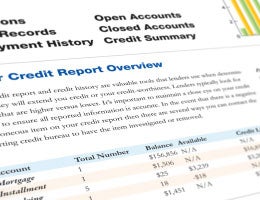6-month homebuyer countdown

If one of your New Year's resolutions is to buy a home this summer, early in the year is the perfect time to get started.
Shopping for a home, a neighborhood and the financing to make it all possible can take time.
Sometimes you hit a glitch, such as an error on a credit report, or an agent who doesn't seem to understand that $300,000 doesn't mean $450,000.
Sometimes you just get tired of driving through neighborhoods you sort of like, only to find out you can't afford even the least expensive houses. Or you're convinced that if you see one more kitchen remodel with black granite countertops and untouched professional-grade appliances, you'll lose it.
Instead, space it out. Give yourself six months between now and the day you're ready to make an offer, and take a few steps each month. Then you'll have a six-month homebuyer countdown.
6 months out: Start a financial file

If you haven't bought a house in the last few years, you're in for a rude surprise. To get financing, buyers have to provide a lot more paperwork these days, says Ron Phipps, principal with Warwick, R.I.-based Phipps Realty and past president of the National Association of Realtors.
Start a pre-qualification file, he recommends. Whether you'll use your computer scanner or a plain manila folder, include your 1099s, pay stubs (at least your last three), copies of your last three tax returns, and a list of your liabilities and assets.
While some experts advise waiting until you're about three months out, the six-month mark can be a good time to get yourself vetted for financing, too. If you qualify, it gives you an idea of how large a loan you can get (as opposed to how much you can comfortably afford). And if any problems pop up, you should have time to fix them.
Whether you want to be pre-qualified (less stringent) or preapproved (more rigorous), at this point is up to you. "The transition from pre-qualified to preapproved is fairly quick," Phipps says.
6 months out: Research mortgage options

Especially if you're a first-time buyer, this is a good time to get advice, says Katie Severance, co-author of "The Complete Idiot's Guide to Selling Your Home." "First-time buyers don't know what goes into a mortgage payment, and that can be very valuable."
This can be a good time to look at what a point either way will mean in terms of your loan. And you can also calculate the difference between options such as a 15- or 30-year mortgage, she says.
Look at what a house will cost you each month -- not only what goes into the note (besides the principal and interest), but the costs of ongoing homeownership, she says.
Examine how much you can comfortably afford each month, and what price range that will equal, Severance advises. "Very often, what the lender says you can afford is different than what you thought you could afford."
One more factor: If you're selling a house, find out if the lender will require you to close on that transaction before you buy, she says. And what are your options if the timing doesn't work the way you planned?
6 months out: Check your credit, look at fees

"Take stock of the financial resources you'll need to close a transaction," says Eric Tyson, author of "Home Buying for Dummies."
How much will you need for a down payment? Closing costs? Fees and other expenses? "And if you talk with mortgage people, they can certainly help you with those numbers," he says.
At this stage, you still have six months to put away additional savings, if you need it.
How much of a down payment will you likely need? What are closing costs in your area? If you know what you'll need, you have at least six months to make sure you have enough.
Pull your credit reports. (You can get them free at AnnualCreditReport.com.)
And, unless you have little or no credit, don't open any new accounts until after you close on your new home. When you apply for new credit, it can shave a few points from your credit score for the next year.
Few or no accounts on your credit report? Talk to a few different lenders about your options. Also, the National Foundation for Credit Counseling has certified housing counselors who can offer advice.
6 months out: Let the search begin

Scout communities. "I would encourage people to cast a fairly broad net in the beginning," Tyson says. "Go out and actually see what's on the market and consider different areas."
Attend a few open houses. You're in "the tire-kicking stage," says Phipps. "Talk to people at open houses, and ask what's going on in the market. Inquire about housing trends (like energy efficiency or green building) in the area, mass transit, schools or anything you find particularly important," he advises.
Begin compiling information on agents. At this point, you can keep it casual. "I would start looking at the Web to see what's out there," Phipps says.
You can also take it a step further if you're ready. "I personally would interview a couple of them to see that I'm getting what I need."
5 months out: Draft your 'wish list'

By now you've seen a few homes, both in person and online. So what appeals and what doesn't?
Phipps eschews calling it a "wish list." Today's buyers, he says, are becoming "more strategic" and more deliberate.
So put pen to paper and actually write down what's vital to you.
Quality of life is especially important to buyers these days, he says. That can be anything from commuting times to the true caliber of the local schools. (No, they're not all "excellent.")
If you're like most buyers, you'll revisit and revise the list a few times before you buy.
4 months out: Narrow your search

By now, you may be focusing on specific neighborhoods or areas. At this point, you can study comparables to get an idea of prices and features, Phipps says. If you find something you really like, "don't hesitate to make an offer," Phipps says.
On the other hand, if you find out that your search has stalled or you're not seeing anything you like, it might be time to revise your search, he says. One big question: Are you being realistic? You may need to consider different areas or revise your list of criteria.
And deep-six any deadlines or duress, Phipps says. "You shouldn't feel pressured."
3 months out: The homestretch

Get that financing finalized. If you haven't gotten your financing in place, now's the time. You have a few months to correct any mistakes. Plus, walking through the door with your own financing at the ready makes you a lot more attractive to sellers.
Hire an agent. "Get someone on your team who's working exclusively for you," says Severance.
Get your agent to put you on "automated email," she says. That way, when something that meets your needs hits the multiple listing service, it will be instantly forwarded to you.
Review that criteria list. Square footage, condition and location are critical at this stage, Severance says. Rank them, realizing that when you sacrifice one, you often get more of another.
1 month out: Pick a winner, recheck finances

At this point, you have identified a couple of good prospects, Phipps says. You should have a good idea of what's common in those areas, as far as prices and amenities.
It's also a good time to double-check your financial records. One recent new twist with regard to financing: Lenders want to see where almost every penny you're using comes from. So if you get a gift or a loan from Mom or Dad, you'll need a letter (and likely a few copies of their bank statements), to support it, says Phipps.
Any four-figure cash deposits to your account? Be prepared to explain them with paperwork, he says.
Now is the time to factor the cost of insurance. "Some properties have a CLUE (Comprehensive Loss Underwriting Exchange) score," Phipps says. It's basically a house's record when it comes to insurance claims. While not all homes have them, if your prospective home does, you want to see it, he says.
Last but not least: The offer

These days, offers are typically more than just a dollar figure.
Offers should be written, Severance says, and should include not only the price you're offering, but the terms (for instance, the fact that you're already qualified for financing or how quickly you can close).
Some buyers like to include a personal note to the seller, she says. To some sellers, it doesn't matter, Severance says, while to others, that personal touch can make the difference.
Source: http://www.bankrate.com/finance/real-estate/6-month-homebuyer-countdown.aspx
dallas weather nike nfl uniforms ben and jerrys free cone day tornado in dallas texas the island president the maldives harper lee
No comments:
Post a Comment
Note: Only a member of this blog may post a comment.